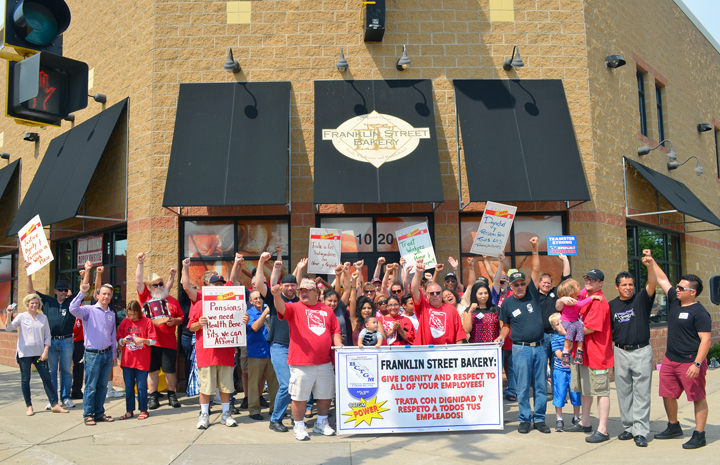

Share
Rosa Baires says Franklin Street Bakery gave her permission to leave her job to travel to New York and care for her dying ex-husband earlier this year. But when she returned, she found herself out of a job.
“I’m very sure that they did fire me because I signed the petition for the union,” Baires said today at a rally outside the Minneapolis bakery, where more than 50 people stood in solidarity with the embattled workers.
Since its organizing drive began this spring, Local 22 of the Bakery, Confectionery, Tobacco Workers and Grain Millers International Union has filed “at least a dozen” charges with the National Labor Relations Board alleging Franklin Street Bakery violated workers’ rights, Local 22 Vice President Wally Borgan said.
And the NLRB can expect another charge this week. Ned Neterval, a lead worker on one of Franklin Street’s dough forming lines, said the baker’s general manager ordered him to stop talking to his co-workers in the break room yesterday about the rally and future union meetings.
“I told him to stop harassing me and go away,” Neterval said. “Eventually he did, but before that he called me a pain in the ass, which was a compliment to me.
“I might be fired, but then there will be another NLRB charge.”
It’s not the first time employer-employee relations have soured at Franklin Street Bakery. The company unleashed a textbook anti-union campaign 10 years ago after workers petitioned for a union election, which they lost by 12 votes.
“They’re using the same playbook, but the attack is a lot different this time,” Borgan said. “Rallies like this are going to keep happening unless these workers get justice.”
Starting pay for the roughly 100 workers at Franklin Street Bakery is $11 per hour, and workers say the company’s draconian attendance policy provides management with an excuse not to offer many raises.
In addition, Franklin Street Bakery workers get no paid holidays, and most cannot afford the premiums to enroll in the company-sponsored health insurance plan.
“Some line leaders have gone three years without a raise,” Neterval said. “Paid time off is the only affordable benefit they provide.”

